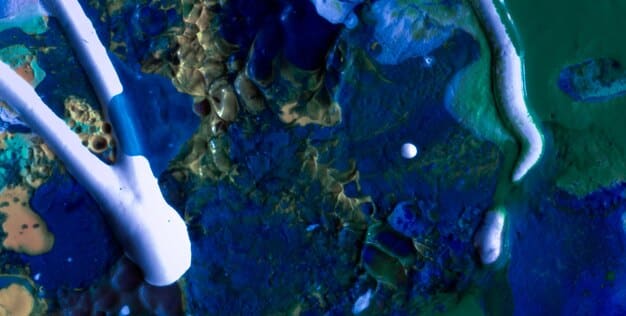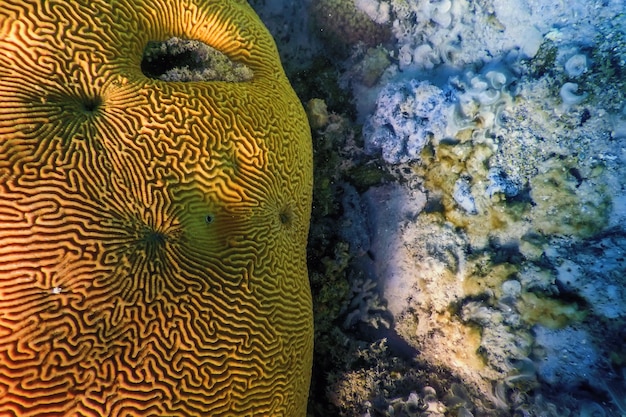Ocean Acidification: Coral Reefs’ Decline in the Next 5 Years

Ocean acidification, caused by increased atmospheric carbon dioxide, poses a significant threat to coral reefs, with the latest research predicting substantial decline in the next five years due to weakened structures and inhibited growth.
The world’s oceans are absorbing alarming levels of carbon dioxide, leading to **ocean acidification: How the latest research predicts coral reef decline in the next 5 years**. This phenomenon drastically alters marine ecosystems, with coral reefs facing the brunt of its impact, threatening their very existence.
Understanding Ocean Acidification and Its Impact
Ocean acidification is a direct consequence of increased carbon dioxide (CO2) levels in the atmosphere, primarily from human activities such as burning fossil fuels. As the ocean absorbs this excess CO2, it undergoes a series of chemical reactions that lower its pH, making it more acidic. This seemingly small change in pH has profound and far-reaching consequences for marine life, especially for organisms that rely on calcium carbonate to build their shells and skeletons, like corals.
The Chemistry Behind Ocean Acidification
The process begins with CO2 dissolving in seawater, forming carbonic acid. This acid then dissociates into bicarbonate and hydrogen ions. The increase in hydrogen ions reduces the availability of carbonate ions, which are essential for calcification – the process by which marine organisms build their shells and skeletons.
Impact on Marine Ecosystems
The impact of ocean acidification extends beyond just corals. Many other marine organisms, including shellfish, plankton, and certain types of algae, are also vulnerable. The disruption of these foundational species can cascade up the food web, affecting fish populations, marine mammals, and ultimately, human communities that depend on the ocean for food and livelihoods.
- Reduced calcification rates in shell-forming organisms.
- Disruption of food webs and marine biodiversity.
- Increased vulnerability to other stressors like warming waters and pollution.
- Economic impacts on fisheries and tourism.
In summary, ocean acidification is a pervasive threat that affects the entire marine ecosystem, impacting biodiversity, food security, and economic stability. Combating this issue requires a global effort to reduce carbon emissions and protect our oceans.

The Dire Prediction for Coral Reefs in the Next 5 Years
The latest research paints a grim picture for coral reefs, projecting significant decline within the next five years due to the escalating effects of ocean acidification. These predictions are based on extensive studies examining the current rate of acidification, its impact on coral growth and resilience, and the potential for adaptation.
Weakened Coral Structures
Ocean acidification directly weakens the structural integrity of coral skeletons, making them more susceptible to erosion and physical damage. As the availability of carbonate ions decreases, corals struggle to build and maintain their calcium carbonate skeletons, leading to thinner, more fragile structures.
Inhibited Coral Growth
The rate at which corals can grow and repair damage is significantly reduced under acidic conditions. This slower growth rate makes it difficult for reefs to recover from disturbances such as storms, bleaching events, and outbreaks of coral predators.
- Accelerated erosion of coral reefs due to weakened structures.
- Reduced ability of reefs to recover from disturbances.
- Loss of habitat for countless marine species.
- Increased coastal vulnerability to storms and erosion.
Overall, the next five years are critical for coral reefs. The continued increase in ocean acidity, combined with other environmental stressors, threatens to push many reefs beyond their ability to recover, leading to widespread degradation and loss.
Specific Coral Species at High Risk
While all coral species are affected by ocean acidification, some are particularly vulnerable due to their specific physiological characteristics and growth rates. Understanding which species are at the highest risk is crucial for targeted conservation efforts.
Stony Corals
Stony corals, which are the primary builders of coral reefs, are among the most threatened. These corals rely heavily on calcification to create their hard skeletons, and their ability to do so is severely hampered by ocean acidification.
Fast-Growing Corals
Fast-growing coral species that depend on rapid calcification rates are also at increased risk. As ocean acidity rises, their ability to maintain their growth pace diminishes, making them more susceptible to being outcompeted by other marine organisms.

- Acropora and Pocillopora corals, known for their rapid growth and complex structures.
- Brain corals, which are slow-growing but essential for reef stability.
- Star corals, which provide important habitat for many marine species.
In conclusion, identifying and protecting these vulnerable species is critical for preserving coral reef biodiversity and ensuring the long-term health of these vital ecosystems.
The Role of Climate Change in Accelerating Acidification
Climate change and ocean acidification are inextricably linked, with climate change playing a significant role in accelerating the rate of ocean acidification. The same human activities that drive climate change, such as burning fossil fuels, also contribute to the increase in atmospheric CO2 that causes ocean acidification.
Increased CO2 Emissions
The continued rise in CO2 emissions from human activities is the primary driver of both climate change and ocean acidification. As more CO2 is released into the atmosphere, the ocean absorbs a greater amount, leading to further acidification.
Warming Waters
Rising ocean temperatures, another consequence of climate change, exacerbate the effects of ocean acidification. Warmer waters hold less dissolved oxygen and can also increase the metabolic rates of marine organisms, making them more vulnerable to acidic conditions.
Mitigation Strategies and Conservation Efforts
Addressing ocean acidification and protecting coral reefs requires a multifaceted approach that combines global efforts to reduce carbon emissions with local conservation strategies.
Reducing Carbon Emissions
The most effective way to combat ocean acidification is to reduce the amount of CO2 released into the atmosphere. This requires a transition to renewable energy sources, improved energy efficiency, and sustainable land-use practices.
Local Reef Management
Local conservation efforts can help to protect coral reefs by reducing other stressors, such as pollution, overfishing, and destructive fishing practices. These measures can increase the resilience of reefs and give them a better chance of surviving the effects of ocean acidification.
- Establishing marine protected areas (MPAs) to safeguard coral reefs.
- Implementing sustainable fishing practices to prevent overfishing.
- Reducing land-based pollution through improved wastewater treatment and agricultural practices.
- Restoring degraded coral reefs through coral gardening and transplantation.
Ultimately, a combination of global and local actions is needed to effectively mitigate ocean acidification and protect coral reefs for future generations. By reducing carbon emissions and implementing targeted conservation strategies, we can help these vital ecosystems survive and thrive.
Hope for the Future: Research and Innovation
Despite the grim predictions, there is still hope for the future of coral reefs. Scientific research and technological innovations are providing new insights into coral resilience and potential solutions for mitigating the effects of ocean acidification.
Coral Adaptation Studies
Researchers are studying coral species that have shown greater resilience to acidic conditions to understand the mechanisms that allow them to survive and thrive. This knowledge can be used to identify and propagate resilient coral strains for reef restoration efforts.
Assisted Evolution
Assisted evolution techniques, such as selective breeding and genetic modification, are being explored to enhance the resilience of corals to ocean acidification and warming waters. These approaches aim to accelerate the natural adaptation process and create coral populations that are better equipped to cope with changing environmental conditions.
- Development of coral probiotics to enhance coral health and resilience.
- Creation of artificial reefs to provide habitat and support coral growth.
- Implementation of carbon capture and storage technologies to reduce atmospheric CO2.
In summary, continued research and innovation are essential for finding effective solutions to mitigate ocean acidification and protect coral reefs. By investing in scientific advancements and supporting conservation efforts, we can increase the chances of preserving these vital ecosystems for future generations.
| Key Point | Brief Description |
|---|---|
| 🌊 Ocean Acidification | Caused by increased CO2, threatens marine life. |
| 📉 Coral Decline | Significant loss predicted in next 5 years. |
| 🌱 Mitigation | Reduce emissions, local conservation, research. |
| 🔬 Research | Adaptation studies, assisted evolution offer hope. |
Frequently Asked Questions
Ocean acidification is the ongoing decrease in the pH of the Earth’s oceans, caused by the uptake of carbon dioxide (CO2) from the atmosphere. This process alters the ocean’s chemistry, making it more acidic.
Ocean acidification reduces the availability of carbonate ions, which are essential for corals to build their skeletons. This leads to weakened coral structures and inhibited growth, making them more vulnerable to damage.
The primary cause of ocean acidification is the increase in atmospheric CO2 levels from human activities, such as burning fossil fuels, deforestation, and industrial processes. The ocean absorbs this excess CO2, leading to acidification.
Mitigation strategies include reducing carbon emissions through renewable energy adoption, improving energy efficiency, and implementing sustainable land-use practices. Local conservation efforts and research into coral resilience are also crucial.
Yes, some coral species have shown greater resilience to acidic conditions. Researchers are studying these species to understand the mechanisms that allow them to survive and thrive, with the goal of using this knowledge for reef restoration.
Conclusion
In conclusion, the threat of **ocean acidification: How the latest research predicts coral reef decline in the next 5 years** is a pressing issue that demands immediate attention and action. While the predictions are dire, ongoing research and conservation efforts offer a glimmer of hope. By reducing carbon emissions, implementing local reef management strategies, and investing in innovative solutions, we can work towards mitigating the impacts of ocean acidification and preserving coral reefs for future generations.





